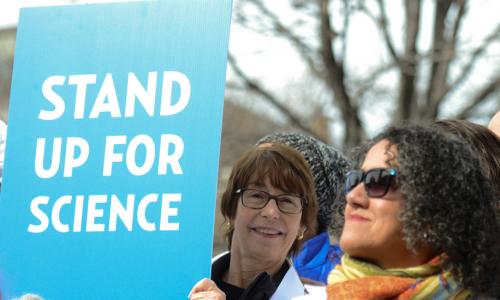Fossil fuel companies and their trade associations have been peddling climate disinformation for decades. Since the late 1980s, when the scientific community overwhelmingly recognized the risks and reality of global warming, these companies and groups have been on the offensive, manufacturing uncertainty and rejecting sound, science-based policy.
Below, we expose their obstructionist tactics and shine light on their decades of deception with 40 key moments in the history of fossil fuel industry climate denial. You can help share the story. Tweet the real #climatefacts today!
1978–1989
1978: Exxon’s own company scientist, James Black, warns that critical choices about changing energy strategies were just 5-10 years away. Source. Tweet
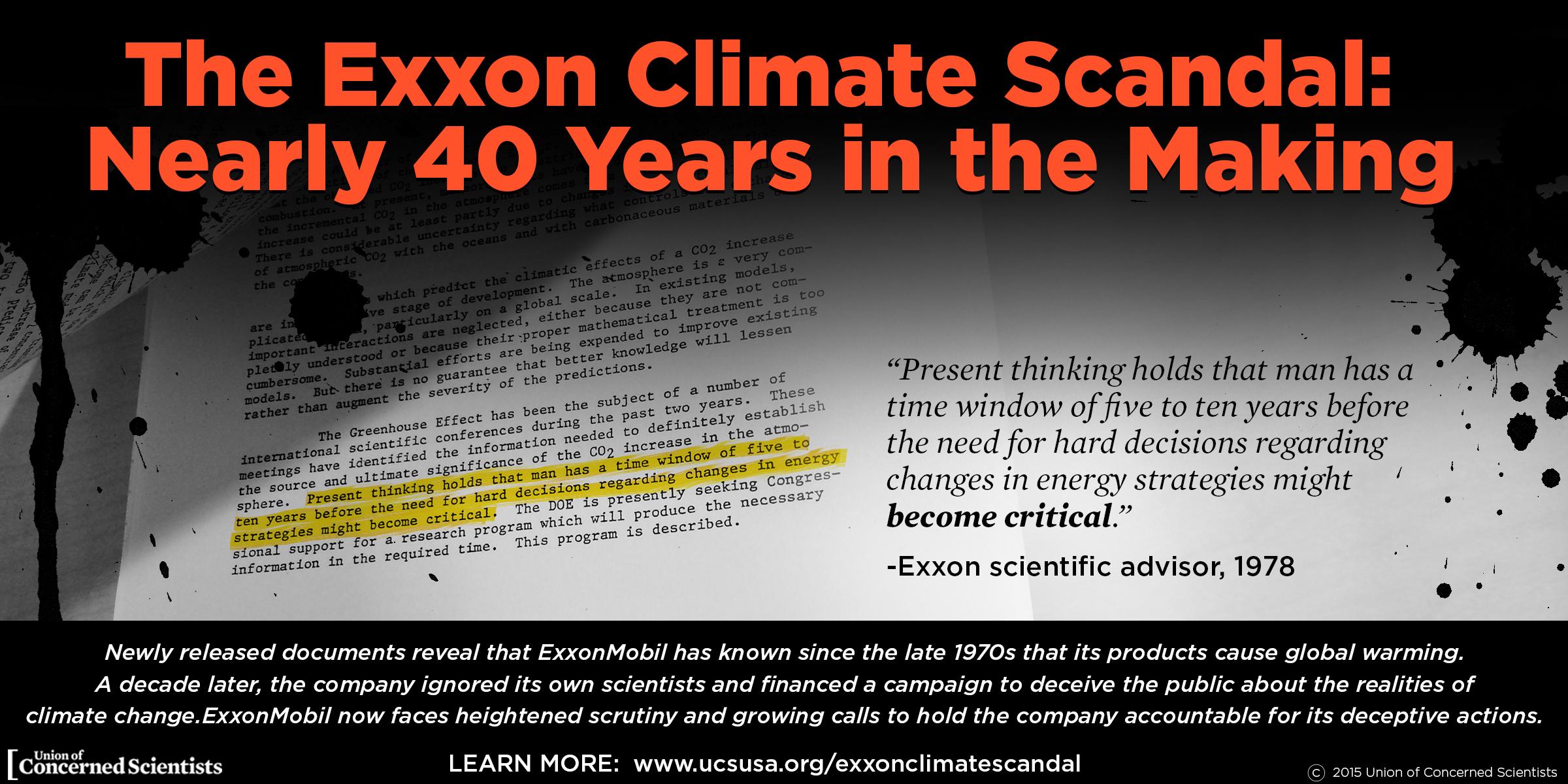
Late 1980s: Exxon curtails its carbon dioxide research. In the decades that follow, Exxon works instead at the forefront of climate denial. Source. Tweet
1988: NASA climate scientist James Hansen testifies in front of Congress that there is a "99% confidence that current temps represent a real warming trend.” Source. Tweet
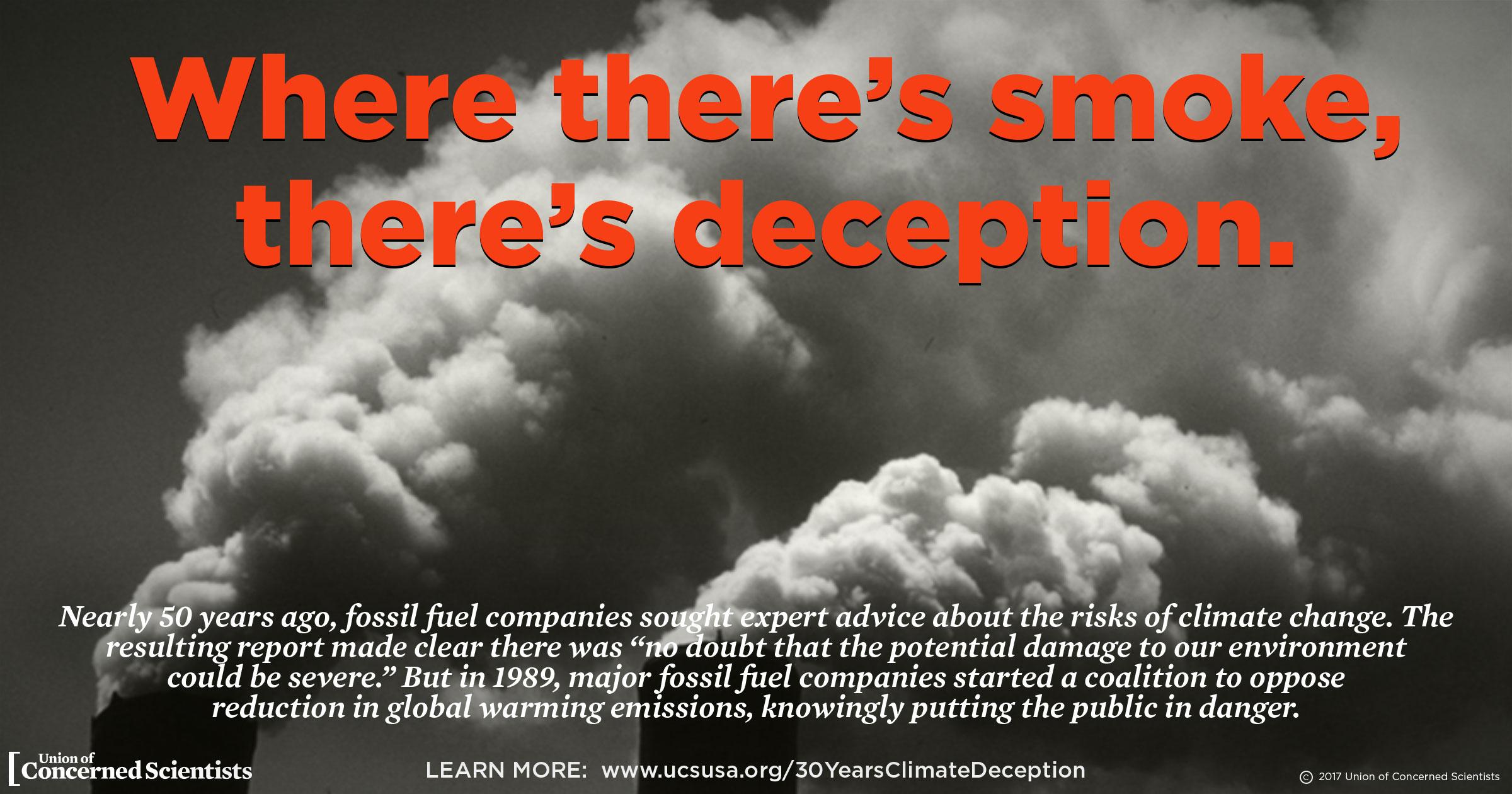
1989: Exxon, Mobil, Chevron, BP, Shell, and other fossil fuel companies start the Global Climate Coalition (GCC) to oppose reductions in carbon emissions. Source. Tweet
1990–1999
1991: A leaked document from a fossil fuel industry front group, the Information Council on the Environment (ICE), reveals the group’s goal to “reposition global warming as theory (not fact).” Source. Tweet
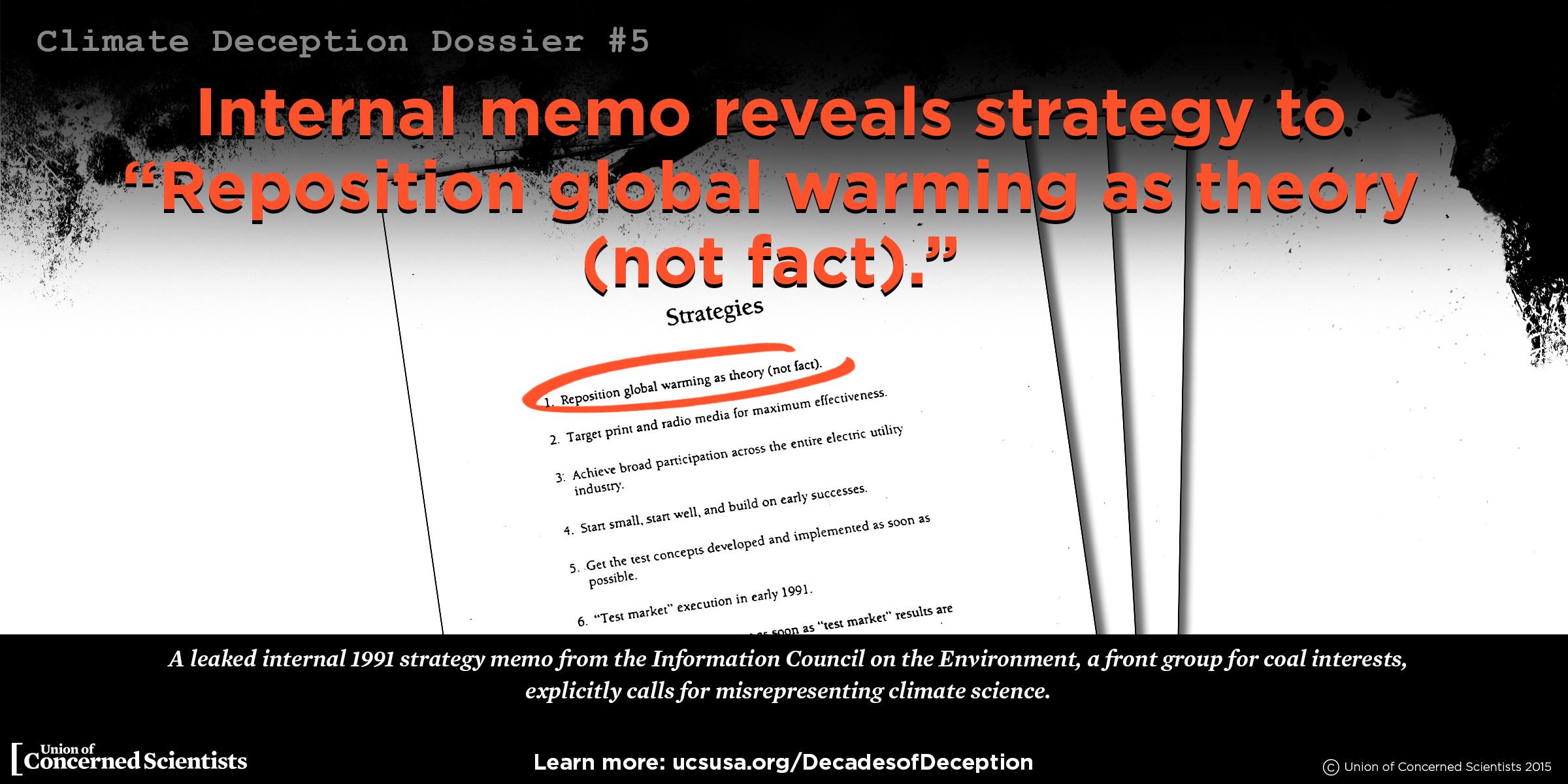
1991: The ICE leaked document reveals a plan to “use a spokesman from the scientific community” to spread climate deception, a strategy designed to gain public credibility. Source. Tweet
1991: The ICE leaked document included information on a $500k advertising campaign designed to disparage climate science and cherry-pick data with the aim of confusing the public. Source. Tweet
1992: Exxon researcher, recognizing the reality of global warming impacts in the Arctic, determines that warming “can only help lower exploration and development” costs for the company. Source. Tweet
1995: The Global Climate Coalition (GCC) commissions a leaked primer on climate science, “Predicting Future Climate Change,” which states unequivocally that the scientific basis for global warming and human impact “is well established and cannot be denied.” Source. Tweet
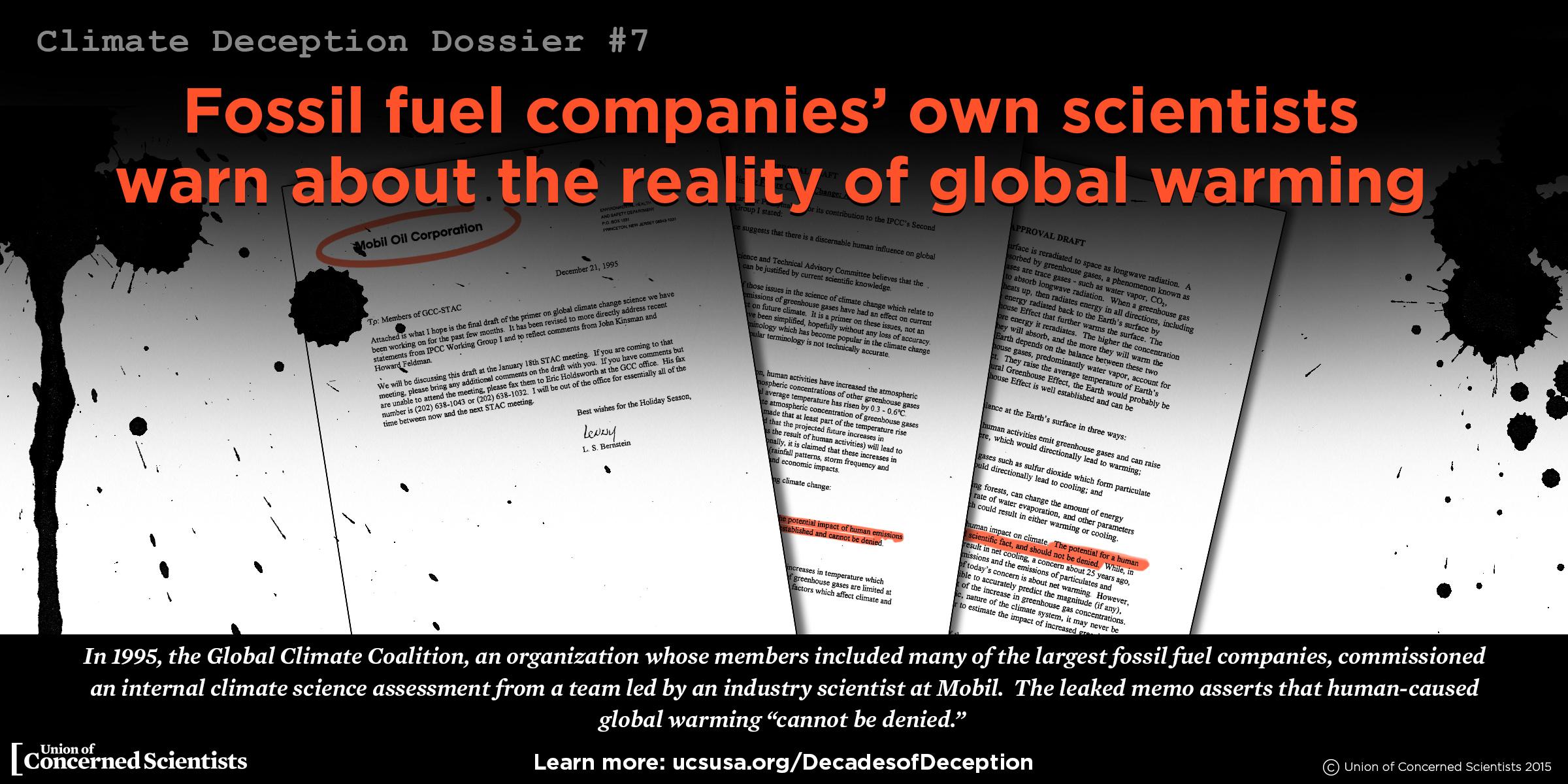
1995: ALEC attempts to influence policy on behalf of the fossil fuel industry, writing in a leaked legislative issue brief that “predictions of catastrophic global warming are theoretical and are not maintained by a general consensus within the scientific community.” Source. Tweet
1996: Exxon CEO Lee Raymond repeatedly emphasizes uncertainty instead of facts, stating that “scientific evidence is inconclusive as to whether human activities are having a significant effect on the global climate.” Source. Tweet
1998: A leaked memo from the oil industry’s trade group the American Petroleum Institute (API)outlines a roadmap for climate deception, claiming that “victory will be achieved when…average citizens 'understand' (recognize) uncertainties in climate science." Source. Tweet
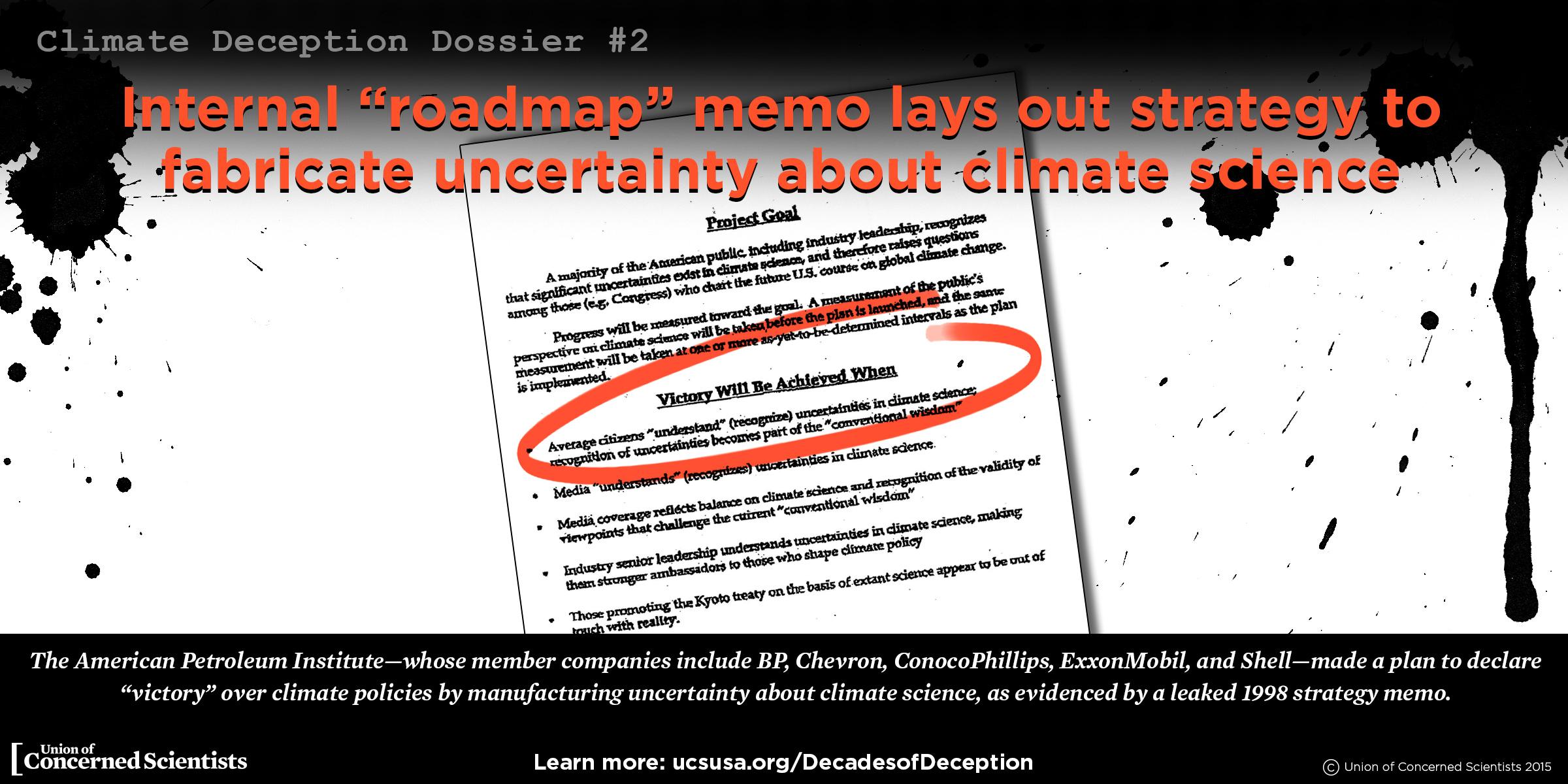
1998: To achieve its notion of victory, API recruits scientists to undercut the “conventional wisdom” on climate science. Source. Tweet
1998: An API memo reveals the plan to “identify, recruit and train a team of five independent scientists to participate in media outreach” emphasizing uncertainty around climate science. Source. Tweet
2000–2009
2000: ExxonMobil publishes an ad in the New York Times falsely stating that, because of natural variability in the earth’s climate, “it is impossible for scientists to attribute the recent small surface temperature increases to human causes.” Source. Tweet
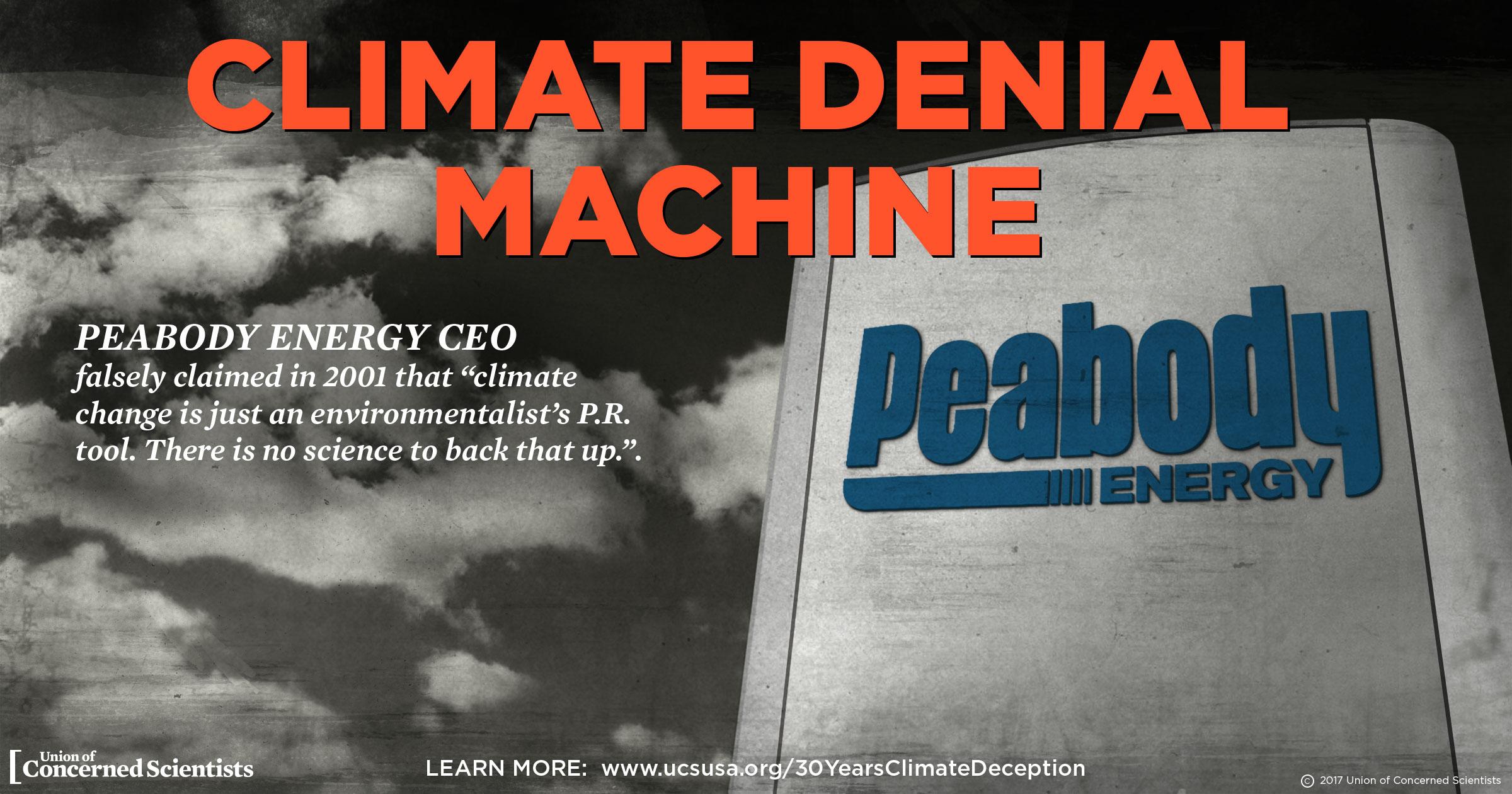
2001: Peabody Energy CEO falsely claims that “climate change is just an environmentalist’s P.R. tool. There is no science to back that up.” Source. Tweet
2001: ExxonMobil lobbyist advises the Bush Administration to replace climate change experts with climate deniers on the Intergovernmental Panel on Climate Change (IPCC) climate assessment. Source. Tweet
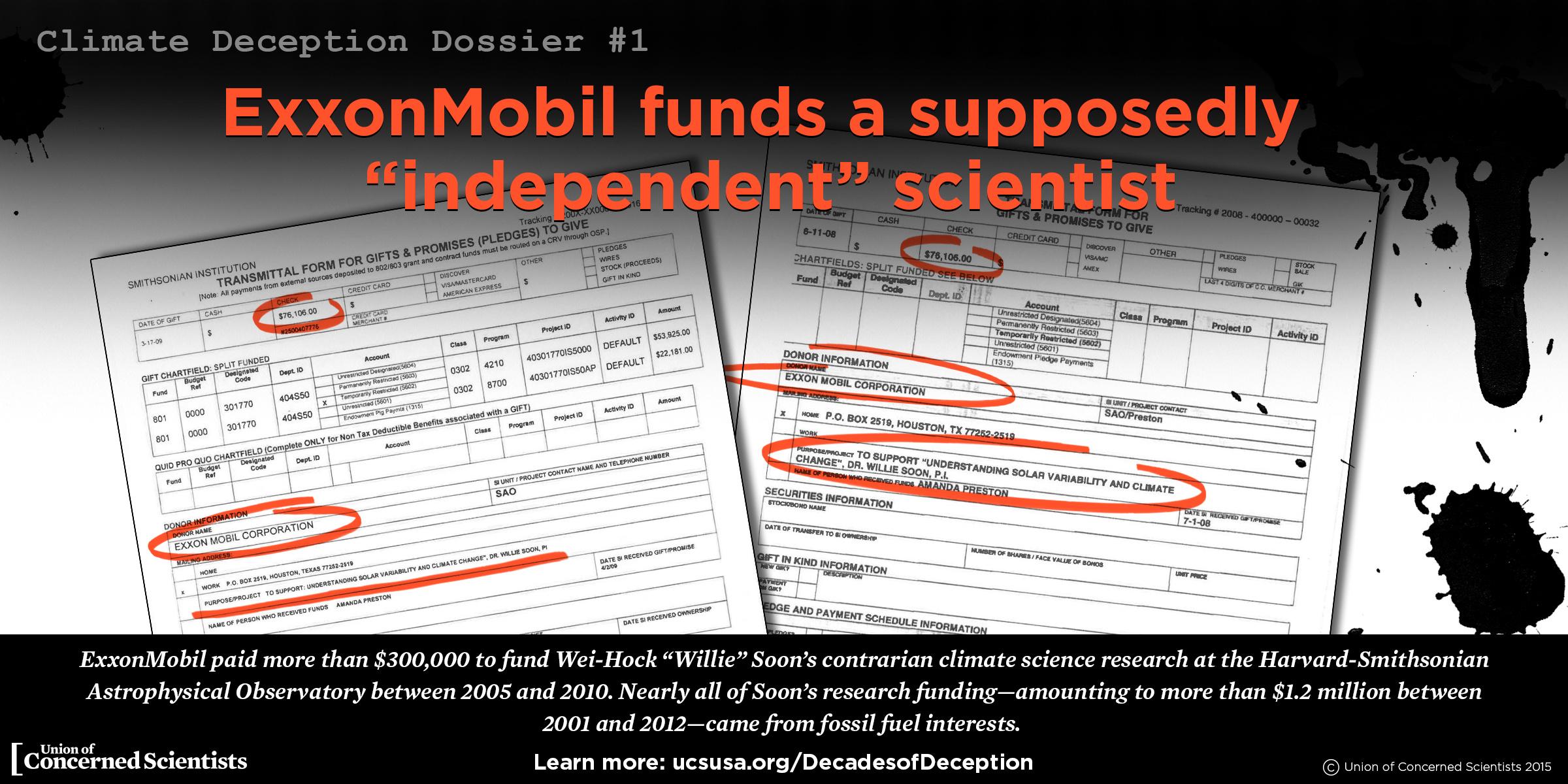
2001 - 2012: ExxonMobil and other fossil fuel interests fund climate contrarian Wei-Hock “Willie” Soon’s discredited research claiming that most global warming could be attributed to the sun. Most of Soon's research funding—more than $1.2 mil from 2001-2012—came from fossil fuel interests. Source. Tweet
2005: ExxonMobil reports recognize that the earth is warming, but claim that “the cause of this trend and whether it is abnormal remain in dispute." Source. Tweet
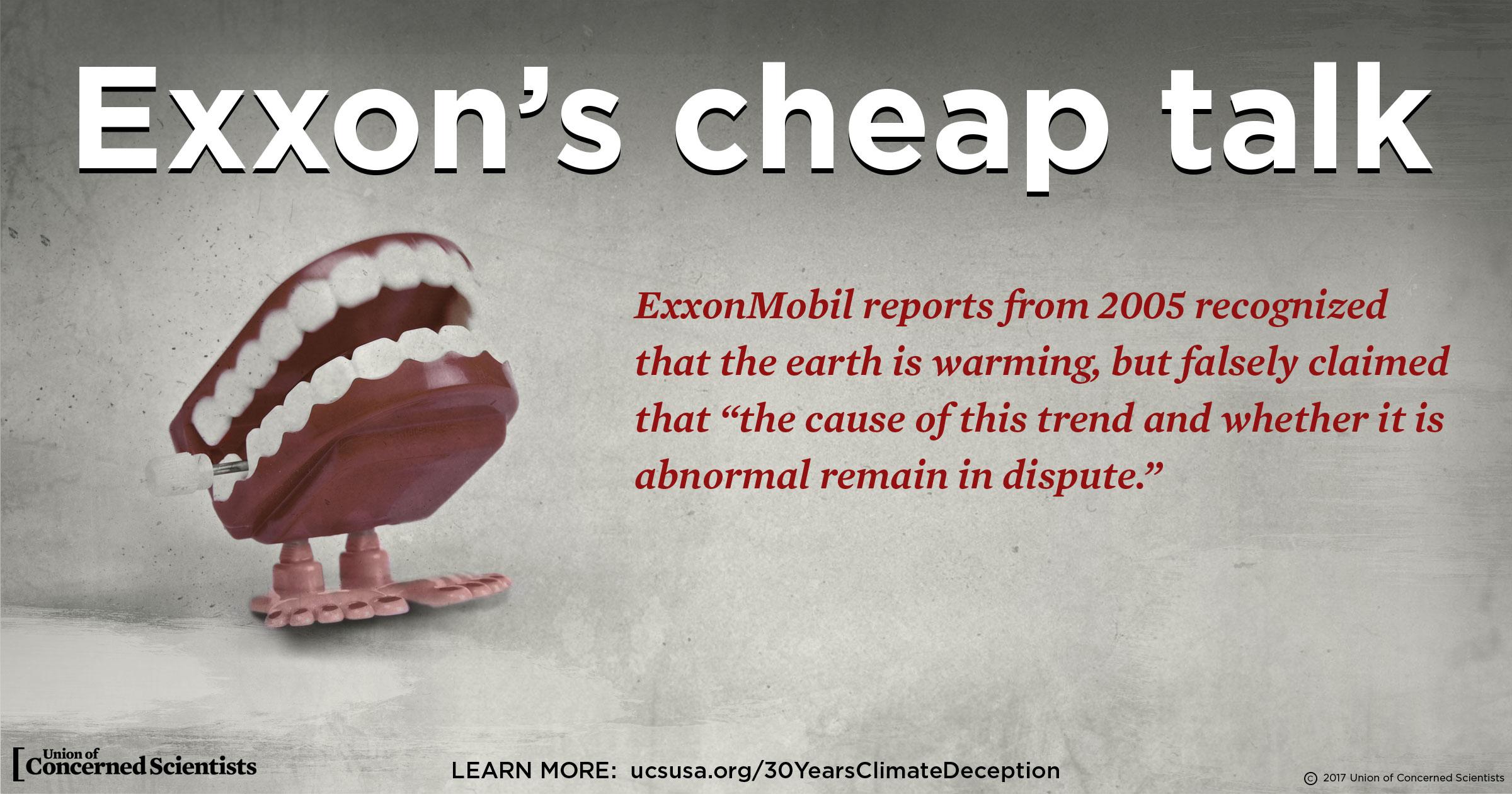
2007: A UCS report finds that ExxonMobil gave nearly $16 million to a network of 43 climate contrarian groups to create confusion around the certainty of global warming. Source. Tweet
2009: A fossil fuel industry front group, the American Coalition for Clean Coal Electricity, sent members of Congress forged letters from NAACP and other nonprofit groups misrepresenting the groups’ positions on a key climate bill coming up for a vote. Source. Tweet
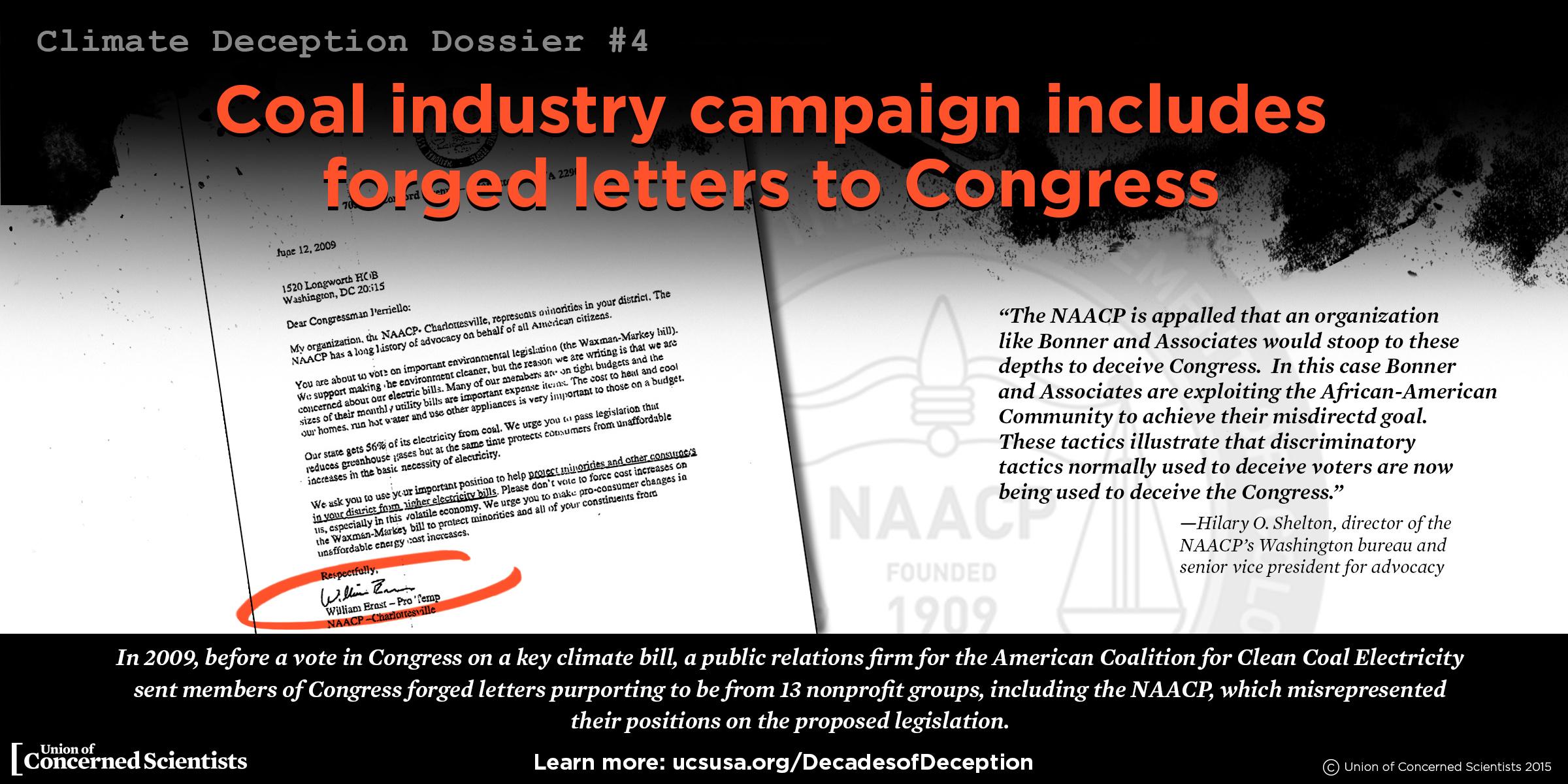
2009: ConocoPhillips submits comments to the EPA claiming that there is a “high degree of uncertainty” surrounding the effects of climate change on public health and welfare. Source. Tweet this fact.
2010–2017
2014: Google leaves ALEC over climate deception campaign, stating: “the facts of climate change are not in question anymore… the people who oppose it are really hurting our children and our grandchildren and making the world a much worse place… they’re just literally lying.” Source. Tweet
2014: A leaked presentation by the Western States Petroleum Association (WSPA) reveals the group’s strategy: create and promote astroturf groups to challenge climate policies on the West Coast. Source. Tweet this fact.
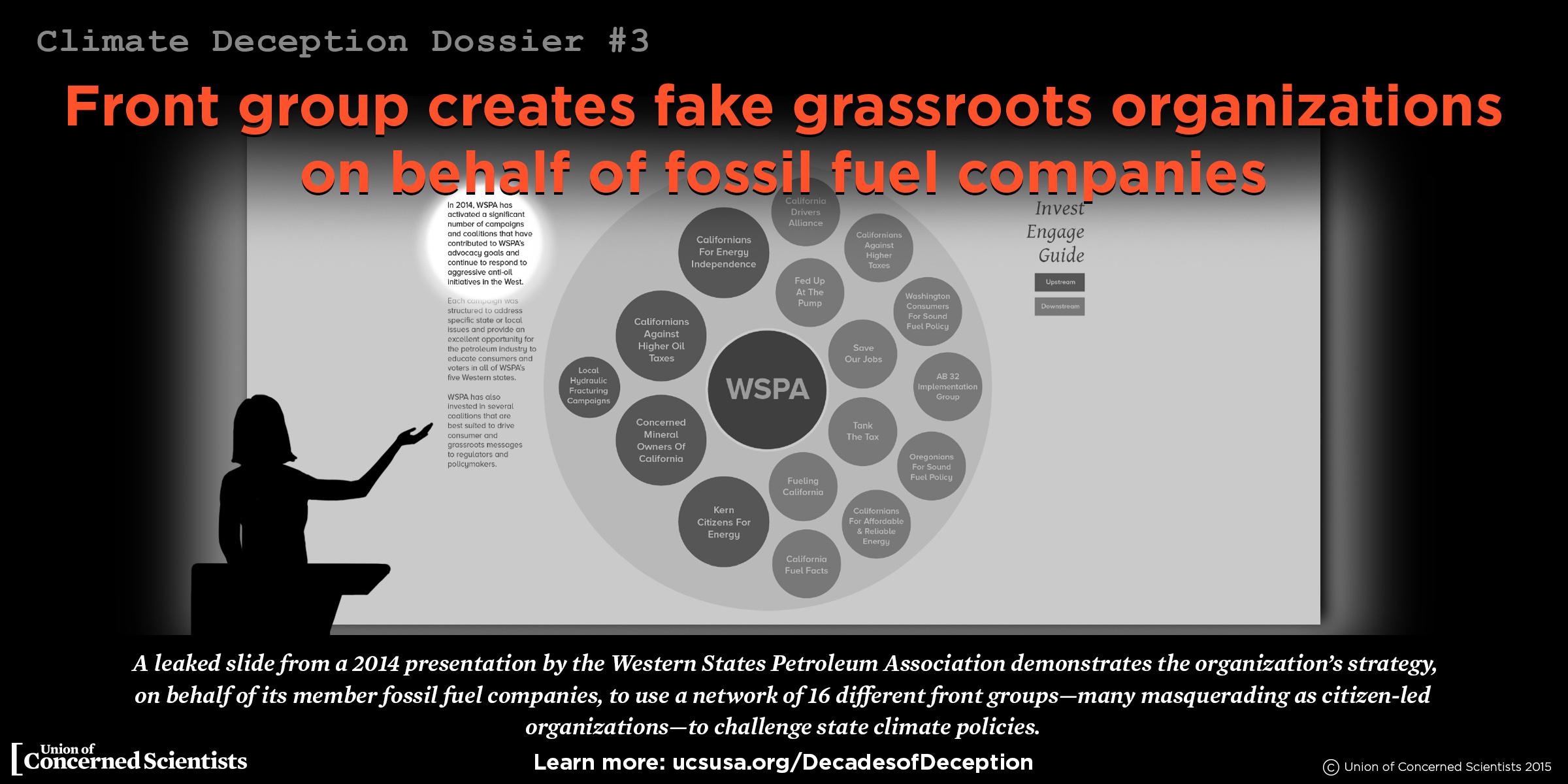
2014: US Chamber of Commerce CEO states during a congressional hearing, on human impact on climate change, “we have a robust debate going on in this country… those that would say everything is settled sort of undercut the integrity of science.” Source. Tweet
2015: The Western States Petroleum Association (WSPA) launches an outright deceptive attack campaign against a CA clean energy bill, mailing pamphlets of disinformation to CA voters. Source. Tweet
2015: On March 23, BP pulls support from ALEC following pressure from UCS and other environmental organizations to disassociate from the group. Source. Tweet
2015: On March 24, Peabody Energy promotes doubt and spreads disinformation, writing the White House Council on Environmental Quality to describe the benefits of rising carbon emissions. Source. Tweet
2015: At ExxonMobil’s annual shareholder meeting on May 27, CEO Rex Tillerson responds to a question about rising greenhouse gas emissions by asserting that we “don’t really know what the climate effects… will be, because the models simply are not that good.” Source. Tweet
2015: On August 7, Shell announces that it will leave ALEC, citing the group’s stance on climate change as “clearly inconsistent with our own.” Source. Tweet
2016: After Peabody Energy declares bankruptcy, financial documents become available, revealing $133,500 in contributions to ALEC over two years. Source. Tweet
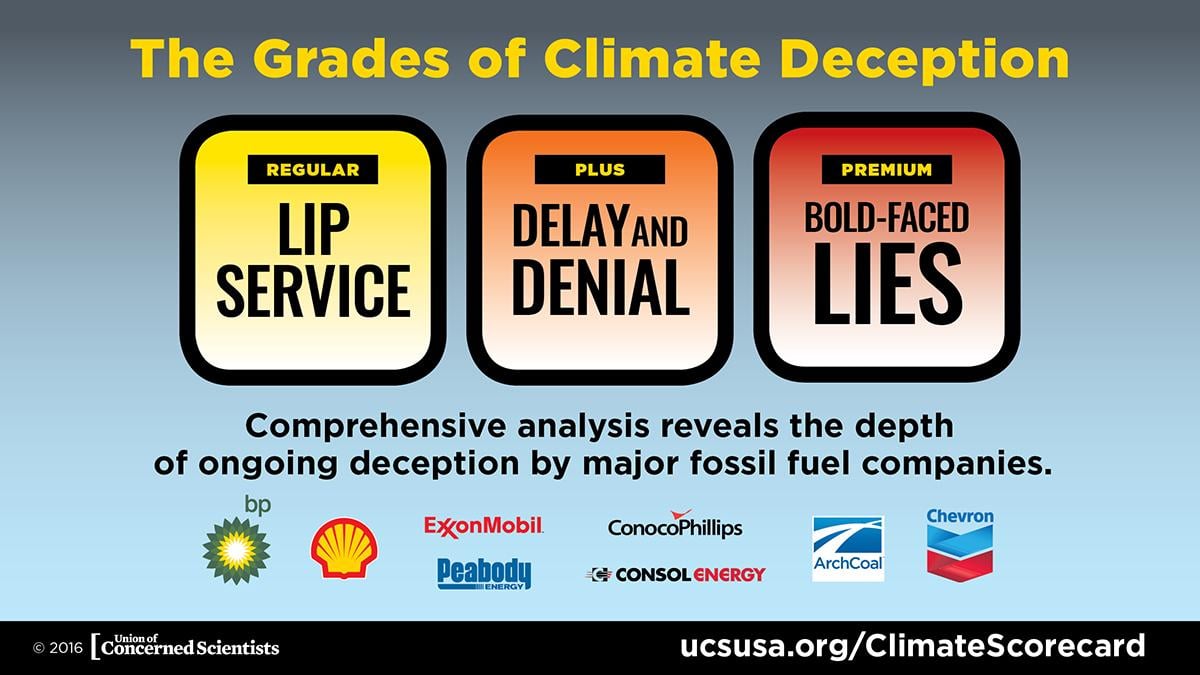
2016: The California oil lobby breaks its spending record, with the Western States Petroleum Association (WSPA) and Chevron spending a combined $25 million attacking healthy air and climate legislation. Source. Tweet
2016: In May, confronted by climate scientist Mike MacCracken on the reliability of climate models, then-CEO Rex Tillerson doubles down on ExxonMobil’s campaign to emphasize doubt, saying “my view on the competencies of the models has really not changed.” Source. Tweet
2016: At Chevron’s annual shareholder meeting, climate scientist Dr. Ben Santer asks about the company’s plans to align its business model with science-based targets. He concludes that “Chevron appears to be unwilling to acknowledge and confront the reality of these impacts. Within the next several decades, reality will confront Chevron.” Source. Tweet
2016: Asked about misleading tactics of the Western States Petroleum Association (WSPA) in opposing limits on carbon emissions from cars and trucks, BP responds: “Of course we did not support that particular campaign,” offering no evidence of distancing itself from WSPA’s disinformation. Source. Tweet
2017: ALEC continues to assert that “climate change is a historical phenomenon and the debate will continue on the significance of natural and anthropogenic contributions.” Source. Tweet
Continuing today
As of 2014, major fossil fuel companies ExxonMobil, Chevron, BP, ConocoPhillips, and Shell were represented on the board of directors of API as of 2014. None have taken any steps to distance themselves from API’s climate disinformation. Source.
As of 2016, major oil companies ExxonMobil, Chevron, BP, and Shell were still represented on the board of directors of WSPA. When will they take steps to publicly distance themselves from climate disinformation and demand an end to WSPA’s misleading campaigns? Source. Tweet
As of 2016, Chevron, ExxonMobil, Peabody Energy were still in leadership roles in ALEC, but have taken no steps to distance themselves from the group’s climate disinformation. Source. Tweet
As of 2016, CONSOL Energy, ConocoPhillips, and Peabody Energy were still in leadership roles in the US Chamber of Commerce, but have taken no steps to distance themselves from the group’s climate disinformation. Source. Tweet



